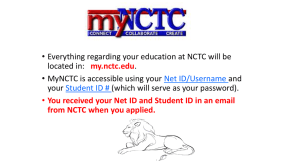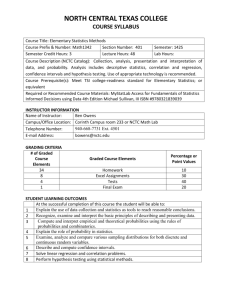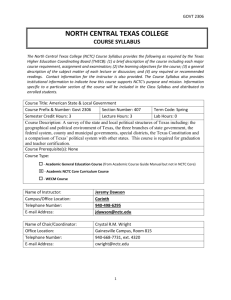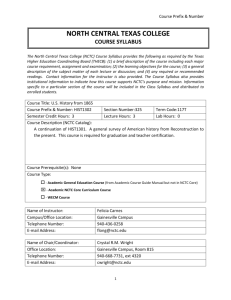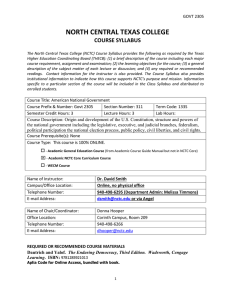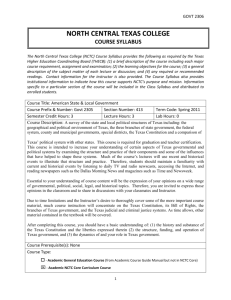course syllabus - North Central Texas College
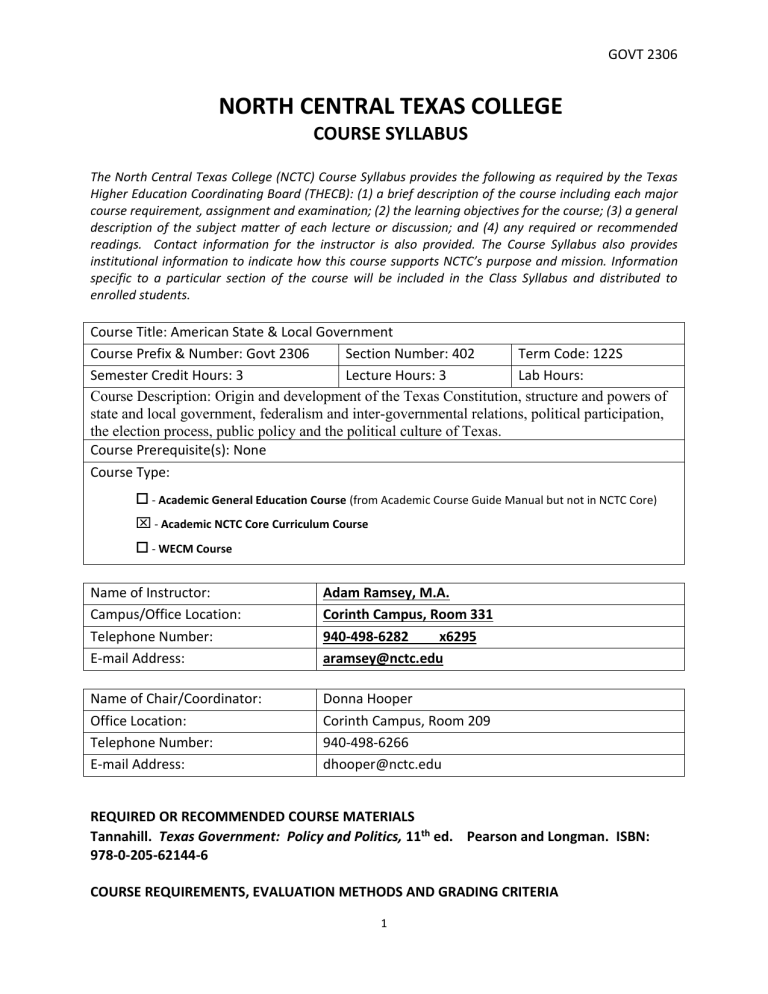
GOVT 2306
NORTH CENTRAL TEXAS COLLEGE
COURSE SYLLABUS
The North Central Texas College (NCTC) Course Syllabus provides the following as required by the Texas
Higher Education Coordinating Board (THECB): (1) a brief description of the course including each major course requirement, assignment and examination; (2) the learning objectives for the course; (3) a general description of the subject matter of each lecture or discussion; and (4) any required or recommended readings. Contact information for the instructor is also provided. The Course Syllabus also provides institutional information to indicate how this course supports NCTC’s purpose and mission. Information specific to a particular section of the course will be included in the Class Syllabus and distributed to enrolled students.
Course Title: American State & Local Government
Course Prefix & Number: Govt 2306
Semester Credit Hours: 3
Section Number: 402
Lecture Hours: 3
Term Code: 122S
Lab Hours:
Course Description: Origin and development of the Texas Constitution, structure and powers of state and local government, federalism and inter-governmental relations, political participation, the election process, public policy and the political culture of Texas.
Course Prerequisite(s): None
Course Type:
- Academic General Education Course (from Academic Course Guide Manual but not in NCTC Core)
- Academic NCTC Core Curriculum Course
- WECM Course
Name of Instructor:
Campus/Office Location:
Telephone Number:
E-mail Address:
Name of Chair/Coordinator:
Adam Ramsey, M.A.
Corinth Campus, Room 331
940-498-6282 x6295 aramsey@nctc.edu
Office Location:
Telephone Number:
E-mail Address:
Donna Hooper
Corinth Campus, Room 209
940-498-6266 dhooper@nctc.edu
REQUIRED OR RECOMMENDED COURSE MATERIALS
Tannahill. Texas Government: Policy and Politics, 11 th ed. Pearson and Longman. ISBN:
978-0-205-62144-6
COURSE REQUIREMENTS, EVALUATION METHODS AND GRADING CRITERIA
1
GOVT 2306
# of Graded
Course Elements
Graded Course Elements
Percentage or
Points Values
4
5
1
1
Exams
Current Event Reports
Special Project: 2013 Texas Legislature
INSTITUTIONAL LEARNING GOALS
Research Essay
50%
20%
15%
15%
A quality general education curriculum in all associate degree programs.
Quality freshman and sophomore level courses in arts and sciences which parallel the lower division offerings of four-year colleges and universities.
Quality technical programs leading directly to careers in semi-skilled and skilled occupations, and quality technical education programs up to two years in length leading to certificates and associate degrees.
Quality programs and services in support of adult literacy and basic skills development as a mean of workforce enhancement and expanding access to higher education.
PROGRAM PURPOSE STATEMENT
NCTC seeks to implement its goal of offering quality general education curriculum in all associate degrees by offering a core of general education courses designed to help students achieve academic, career and lifelong goals. Acquiring knowledge, thinking critically, and utilizing the methodologies of various disciplines exposed students to experiences that serve to advance their personal growth. The chief focus of the General Education Core Curriculum at
NCTC is to emphasize Exemplary Educational Objectives and Basic Intellectual Competencies.
DEPARTMENTAL PURPOSE STATEMENT
The NCTC Social Science Department provides students at NCTC a strong foundation in the liberal arts that is essential for career success, leadership, global citizenship, and a lifetime of learning. The department provides students with a broad knowledge and understanding of the world; significant intellectual, critical thinking and practical skills; and a strong sense of civic responsibility for enriching their lives and making a difference in society.
STATEMENT OF SKILLS AND KNOWLEDGE EXPECTED OF NCTC GRADUATES
NCTC seeks to implement its goal of offering a core of general education courses designed to help students achieve academic, career and lifelong goals. The chief focus of the General
2
GOVT 2306
Education Core Courses at NCTC is to emphasize basic intellectual competencies and broad intellectual perspectives.
CORE CURRICULUM COMPONENT AREA
The overall objective of the Social & Behavioral Science component area is to increase students’ knowledge of how social and behavioral scientists discover, describe, and explain the behaviors and interactions among individuals, groups, institutions, events and ideas. Such knowledge will better equip students to understand themselves and the roles they play in addressing the issues facing humanity.
SOCIAL & BEHAVIORAL SCIENCE: EXEMPLARY EDUCATIONAL OBJECTIVES (EEOs)
(SBS1) To employ the appropriate methods, technologies and data that social and behavioral scientists use to investigate the human condition.
(SBS2) To examine social institutions and processes across a range of historical periods, social structures, and cultures.
(SBS3) To use and critique alternative explanatory systems or theories.
(SBS4) To develop and communicate alternative explanations or solutions for contemporary social issues.
(SBS5) To analyze the effects of historical, social, political, economic, cultural, and global forces on the area under study.
(SBS6) To comprehend the origins and evolution of U.S. and Texas political systems, with focus on the growth of political institutions, the constitution of the U.S. and Texas, federalism, civil liberties, and civil and human rights.
(SBS7) To understand the evolution and current role of the U.S. in the world.
(SBS8) To differentiate and analyze historical evidence (documentary and statistical) and differing points of view.
(SBS9) To recognize and apply reasonable criteria for the acceptability of historical evidence and social research.
(SBS10) To analyze, critically assess, and develop creative solutions to public policy problems.
(SBS11) To recognize and assume one’s responsibility as a citizen in a democratic society by
3
GOVT 2306 learning to think for oneself, by engaging in public discourse, and by obtaining information through the news media and other appropriate information sources about politics and public policy.
(SBS12) To identify and understand differences and commonalities within diverse cultures.
STUDENT LEARNING OUTCOMES
EEO Student Learning Outcome
3,5,6,8 Explain the origin and development of the Texas Constitution.
2,4,5,6,8 Demonstrate an understanding of state and local political systems and their relationship with the federal government.
3,5,6,8 Describe separation of powers and checks and balances in both theory and practice in Texas.
3,5,11 Demonstrate knowledge of the legislative, executive, and judicial branches of Texas government.
1,2,4,6, Evaluate the role of public opinion, interest groups, and political parties in Texas.
2,3,4,5 Analyze the state and local election process.
4,5,8,9 Describe the rights and responsibilities of citizens.
5,6 Identify the courts in the Texas Judicial System and their respective jurisdictions.
10,11 Analyze issues, policies, and political culture of Texas.
1,9,11 Research and compose an essay assignment/argument using proper grammar/English and basic computer skills.
GENERAL DESCRIPTION OF SUBJECT MATTER FOR EACH LECTURE/DISCUSSION
Topic
State Constitution
General Description of Subject Matter
Historical/Political development from Republic to
Present
State and Federalism
Political Participation
State Policymaking within Federal system
Voting rights, political participation and types of elections
Political Parties & Interest Groups Development within the state and policymaking powers
The Texas Legislature Structure, Membership, Legislative Process, &
Policymaking
Executive Branch The Governor, Executive Bureaucracy & Decentralized power
Judicial Branch
Local Government
State Budget Policy
The Texas Court System, Structure and Jurisdiction;
Judicial Election/Appointment process; Civil/Criminal laws and punishments
Structure, Power, and Policymaking: City, County;
School; and Special Districts
Types of state revenue; expenditures; budgetary process
4
GOVT 2306
BASIC INTELLECTUAL COMPETENCIES FOR THIS COURSE
READING – Reading at the college level means the ability to analyze and interpret a variety of printed materials – books, articles and documents. A core curriculum should offer student the opportunity to master both general methods of analyzing printed materials and specific methods for analyzing the subject matter of individual disciplines.
WRITING – Competency in writing is the ability to produce clear, correct, and coherent prose adapted to purpose, occasion, and audience. Although correct grammar, spelling, and punctuation are each a sine qua non in any composition, they do not automatically ensure that the composition itself makes sense or that the writer has much of anything to say. Students need to be familiar with the writing process including how to discover a topic and how to develop and organize it, how to phrase it effectively for their audience. These abilities can be acquired only through practice and reflection.
SPEAKING – Competence in speaking is the ability to communicate orally in clear, coherent, and persuasive language appropriate to purpose, occasion, and audience. Developing this competency includes acquiring poise and developing control of the language through experience in making presentations to small groups, to large groups, and through the media.
LISTENING – Listening at the college level means the ability to analyze and interpret various forms of spoken communication.
CRITICAL THINKING – Critical thinking embraces methods for applying both qualitative and quantitative skills analytically and creatively to subject matter in order to evaluate arguments and to construct alternative strategies. Problem solving is one of the applications of critical thinking, used to address an identified task.
COMPUTER LITERACY – Computer literacy at the college level means the ability to use computer-based technology in communicating, solving problems, and acquiring information. Core-educated students should have an understanding of the limits, problems, and possibilities associated with the use of technology, and should have the tools necessary to evaluate and learn new technologies as they become available.
5
GOVT 2306
Last day to Withdraw
Student Rights &
Responsibilities
For the Spring 2013 semester, the last day to withdraw from a course with a “W” is April 12, 2013.
NCTC Board policy FLB (Local) Student Rights and Responsibilities states that each student shall be charged with notice and knowledge of the contents and provisions of the rules and regulations concerning student conduct. These rules and regulations are published in the Student
Handbook published in conjunction with the College Catalog. All students shall obey the law, show respect for properly constituted authority, and observe correct standards of conduct.
Scholastic Integrity Scholastic dishonesty shall constitute a violation of college rules and regulations and is punishable as prescribed by Board policies.
Scholastic dishonesty shall include, but not be limited to cheating on a test, plagiarism, and collusion.
STUDENT SUPPORT SERVICES
Office for Students with Disabilities (OSD) provides accommodations for students who have a documented disability. A disability is anything that can interfere with learning, such as a learning disability, psychological challenge, physical illness or injury. Accommodations may include extra time on tests, tests in a distraction reduced environment, volunteer note taker in class, etc.
On the Corinth Campus, go to room 170 or call 940-498-6207 or 940-498-6224. On the Gainesville
Campus, go to room 110 in the Administration (100) Building or call 940-668-4209. Students on the
Bowie, Graham, Flower Mound, and online campuses should call 940-668-4209 to arrange for an intake appointment with OSD.
North Central Texas College is on record as being committed to both the spirit and letter of federal equal opportunity legislation, including the Americans with Disabilities Act (ADA) of 1990, ADA Amendments
Act of 2009, and Section 504 of the Rehabilitation Act of 1973 (P.L. 93-112).
Financial Aid Office is responsible for administering a variety of programs for students who need assistance in financing their education. The first step for financial aid is to complete a FAFSA. For more information, please visit your nearest Financial Aid Office.
Student Success Center is designed to help all students at NCTC develop tools to achieve their academic goals. The center links students to FREE tutoring, including a Writing Center, a Math Lab, and free online tutoring in the evening. The program helps students acclimate to college by providing students free interactive workshops about Time Management, Study Skills, Test Anxiety, and much more. For more information, please visit your nearest Student Success Center.
As of January 1, 2012, all campuses of North Central Texas College are tobacco-free. NCTC is committed to providing a safe and healthy environment for its employees, students and visitors. As a result of becoming a tobacco-free campus NCTC will restrict the use of any and all tobacco products at all NCTC campus. Click Clearinthe Air for complete details.
6
